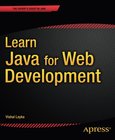Program Development in Java
Abstraction, Specification and Object-Oriented Design

Book Details:
| Publisher: | Addison-Wesley Professional |
| Series: | Addison Wesley , Object-Oriented |
| Author: | B. Liskov |
| Edition: | 1 |
| ISBN-10: | 0201657686 |
| ISBN-13: | 9780201657685 |
| Pages: | 464 |
| Published: | Jun 16 2000 |
| Posted: | Nov 19 2014 |
| Language: | English |
| Book format: | |
| Book size: | 24.32 MB |
Book Description:
Written by a world-renowned expert on programming methodology, and the winner of the 2008 Turing Award,this book shows how to build production-quality programs--programs that are reliable, easy to maintain, and quick to modify. Its emphasis is on modular program construction: how to get the modules right and how to organize a program as a collection of modules. The book presents a methodology effective for either an individual programmer, who may be writing a small program or a single module in a larger one; or a software engineer, who may be part of a team developing a complex program comprised of many modules. Both audiences will acquire a solid foundation for object-oriented program design and component-based software development from this methodology. Because each module in a program corresponds to an abstraction, such as a collection of documents or a routine to search the collection for documents of interest, the book first explains the kinds of abstractions most useful to programmers: procedures; iteration abstractions; and, most critically, data abstractions. Indeed, the author treats data abstraction as the central paradigm in object-oriented program design and implementation. The author also shows, with numerous examples, how to develop informal specifications that define these abstractions--specifications that describe what the modules do--and then discusses how to implement the modules so that they do what they are supposed to do with acceptable performance. Other topics discussed include: Encapsulation and the need for an implementation to provide the behavior defined by the specification Tradeoffs between simplicity and performance Techniques to help readers of code understand and reason about it, focusing on such properties as rep invariants and abstraction functions Type hierarchy and its use in defining families of related data abstractions Debugging, testing, and requirements analysis Program design as a top-down, iterative process, and design patterns The Java programming language is used for the book's examples. However, the techniques presented are language independent, and an introduction to key Java concepts is included for programmers who may not be familiar with the language.
Download Link:
Related Books:
Continuous Enterprise Development in Java
Learn a use-case approach for developing Java enterprise applications in a continuously test-driven fashion. With this hands-on guide, authors and JBoss project leaders Andrew Lee Rubinger and Aslak Knutsen show you how to build high-level components, from persistent storage to the user interface, using the Arquillian testing platform and several other JBoss projects and tools.Through the course of the book, you'll build a production-ready software conference tracker called GeekSeek, using source code from GitHub. Rubinger and Knutsen demonstrate why testing is the very foundation of development-essential for ensuring that code is consumable, complete, and correct.Bootstrap an elementary Java EE project from start to finish before diving into the ful...
Learn Java for Web Development
Modern Java Web Development
Web development is still one of today's most popular, active, and important programming and development activities. From a single web page to an e-commerce-enabled web site to a fully-fledged web application, the Java programming language and its frameworks allow you great flexibility and productivity for your web application development.Learn Java for Web Development teaches web developers who are new to Java key skills, Java-based languages, and frameworks to build simple or complex web sites and applications. As soon as you pick up this book, Vishal Layka's experience guides you on a very practical learning and building journey. You will learn the Java nuts and bolts necessary to build a simple "HelloWorld" Java (native) application, as ...
Data Structures And Program Design In C ++
Explores problem solving & programming principles, data abstraction, recursion, & the comparative analysis of algorithms as fundamental tools of software design. DLC: C++ (Computer program language)
In a surprisingly lively textbook-style treatment, Data Structures and Program Design in C++ delivers expertise and plenty of sample programs for the working C++ programmer or computer science student.
While some books on data structures stress theory and mathematical concepts over real-world sample code, this guide illustrates its tour of data structures--such as stacks, lists, queues, trees, and graphs--with clear, engaging samples. Throughout, the authors make use of built-in C++ features (such as the Standard Template Library [STL] and tem...
2007 - 2021 © eBooks-IT.org



